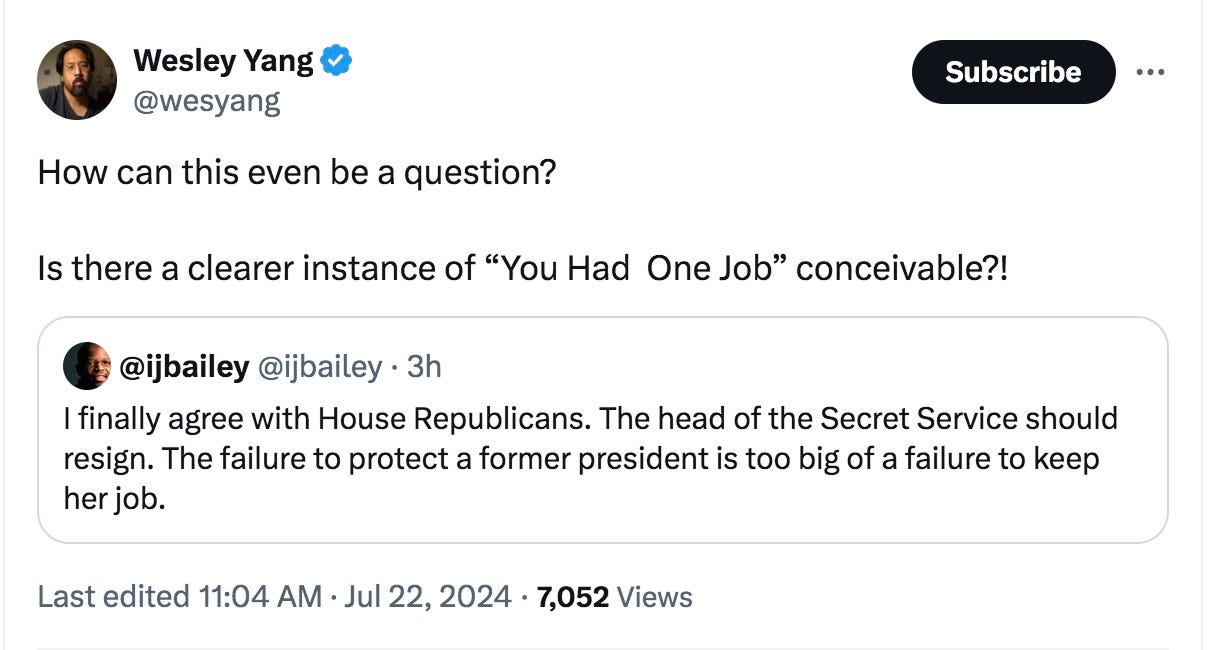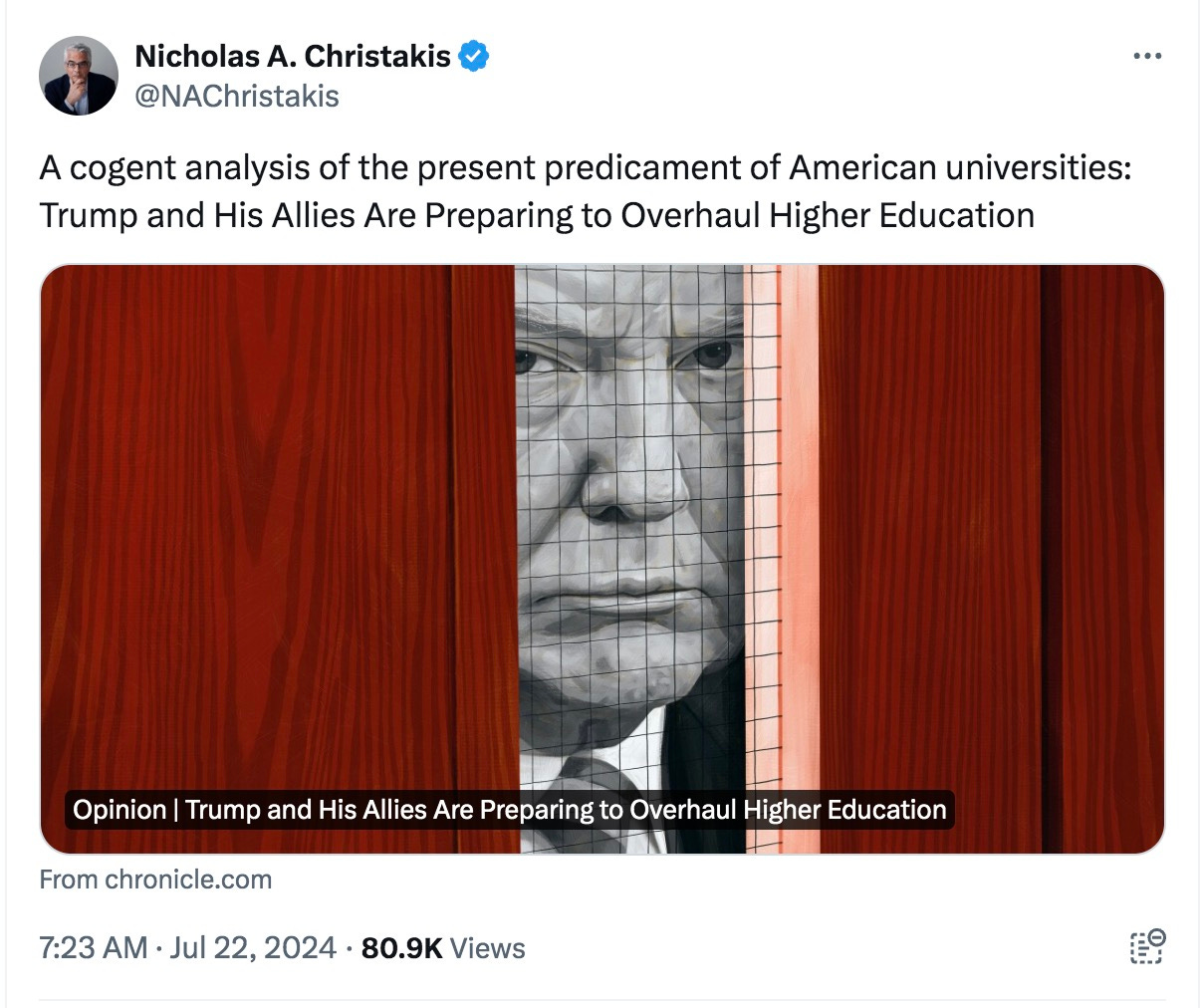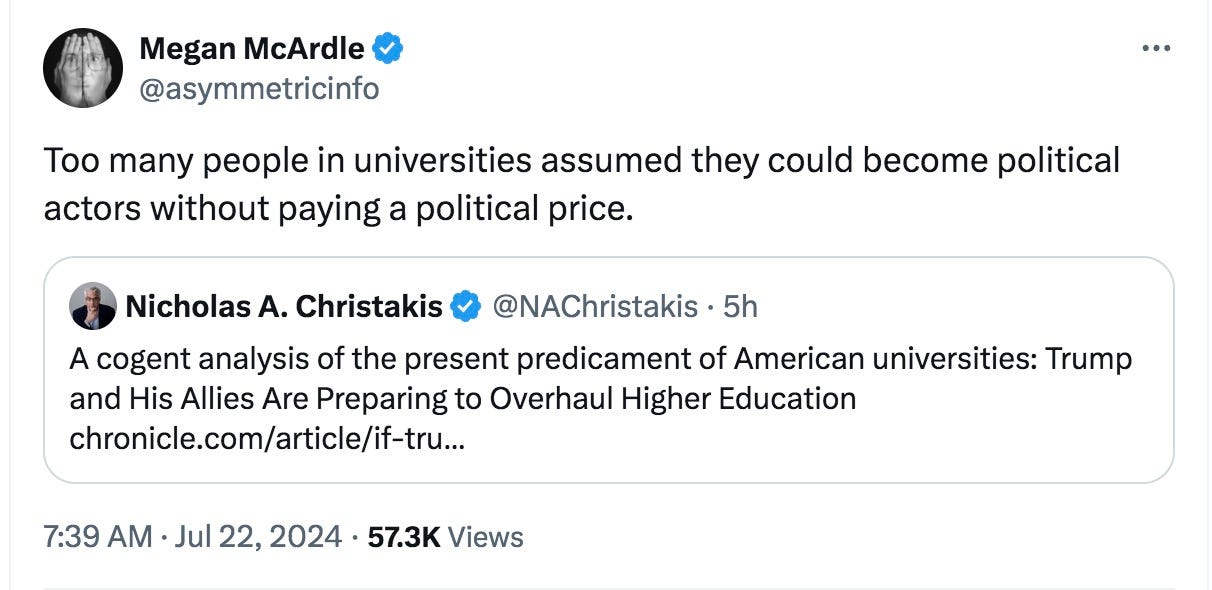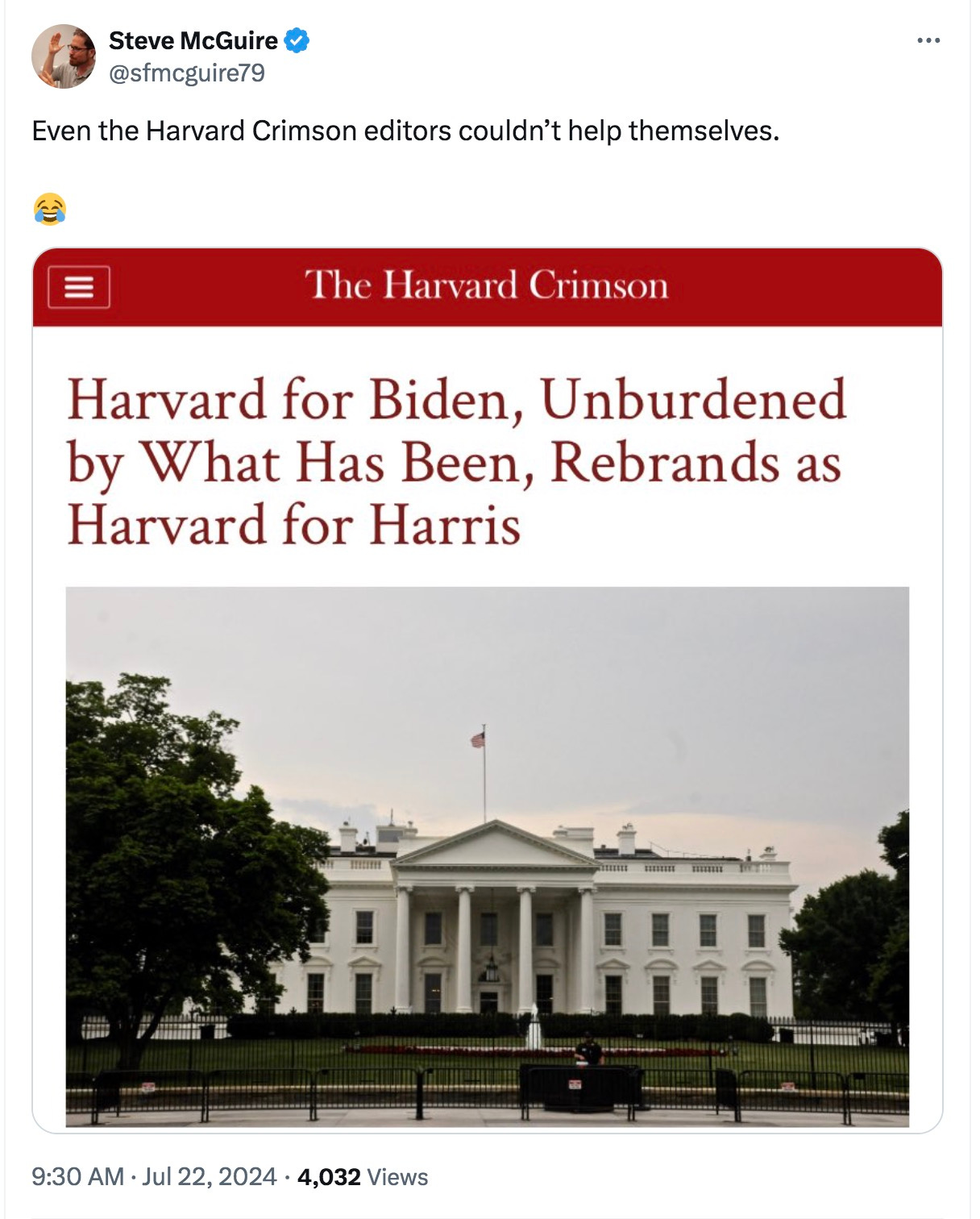E-Pluribus | July 22, 2024
Actually, *violence* is violence; politics as entertainment; and is JD Vance a beneficiary of D.E.I.?
A round-up of the latest and best musings on the rise of illiberalism in the public discourse:
Greg Lukianoff: Why the ‘words are violence’ argument needs to die
“Sticks and stones may break my bones but words can never hurt me,” children are taught (or at least they used to be.) Most adults realize that, despite the rhyme, words can indeed hurt. However, Greg Lukianoff writes at his Substack, The Eternally Radical Idea, that doesn’t make words actual violence; often trying to equate the two is simply an effort to censor.
Anyone who equates speech and violence has likely never been punched in the face. I have been punched in the face quite a bit, and I have to tell you: It hurts. Of course, how much it hurts depends on who is hitting you. I once let a smaller kid punch me twice to show he was incapable of hurting me. It did hurt, but I didn’t want him to know that. So I just picked him up and calmly said, “Stop.” He stopped. Another time I was hit so hard that I got a concussion and couldn’t join spring training for football that year.
[. . .]
As I got bigger and stronger, I prided myself on being an “anti-bully” — someone who would stick up for other kids even if it meant fighting bullies, which I did. I remember telling my father this quite proudly, and he simply responded, “My son, is that not just another kind of bully?”
To this day, that one sentence feels like someone splashed my face with ice water. He was absolutely right. What started as me trying to be a white knight didn't end that way. And sometimes it was just an excuse for venting my own anger. And as we know now from psychological research, anger is like a fire: The more you feed it, the bigger it gets.
[. . .]
This isn’t to say that people can’t hurt or abuse one another with the things they say, or that trauma and emotional pain aren’t also real. I’ve been very open about my own struggles with mental health. I know that pain too. But equating a barbed tongue with a barbed spear not only betrays a lack of understanding of genuine violence, but also the way words — even harsh ones — have served as both an alternative and a solution to violence.
[. . .]
The notion that speech is violence fails to recognize the essential role of provocative speech and art, the revelation of harsh truth in science, and the reality of messy and distorted psychological states people can genuinely find themselves in. Most importantly, however, it is an affront to the foundation of our democracy and modern civilization. The bright line between action and speech is one of the best things humankind has ever devised, and it has been an engine for peace, progress, artistic achievement, and innovation for centuries. Without that line, representative government — not to mention the freedom to be our authentic selves without fear — is impossible.
Equating words and violence is also emotional blackmail — a rhetorical tactic Rikki Schlott and I talk about in our book, “The Canceling of the American Mind.” Emotional blackmail is a way to shut down your opponent’s rational faculties, often by using an appeal to empathy for one group or person to discourage empathy for another. It’s effective at making a person think, “Well, I don’t want to hurt anyone. And if good people believe this, I probably shouldn’t think about it too hard.”
The irony, of course, is that the “words are violence” argument is almost always used to justify hurting other people. And if you’re not a fan of hurting people, hurting people to prevent hurting people seems like a doomed mission, doesn’t it? That is, of course, unless the people you’re hurting are bad and the people for which you’re hurting them are good.
Read the whole thing.
Nick Catoggio: The Bread-and-Circus Stage of American Decline
The Dispatch’s Nick Catoggio (Allahpundit of anonymous Twitter fame) has a tendency towards pessimism; his Twitter avatar is war criminal Slobodan Praljak drinking poison in a courtroom, after all. And his most recent column is no exception. Catoggio writes that the “last month of American politics has seen more bombshells than eastern Ukraine,” and this was written before Joe Biden bowed out of the 2024 race. But, he says, one of those bombshells (“Trump has changed!”) was a dud.
“There appears to be a new softness to Donald Trump,” [Reporter Natalie Allison] tweeted, “with people who’ve talked [to] him describing him with words like ‘existential,’ ‘serene,’ ‘emotional’ and even ‘spiritual.’”
Scott Jennings, a Republican analyst for CNN, echoed the point shortly before Trump walked out to accept his party’s nomination last evening: “I’ve seen a big chunk of Trump’s speech … folks, buckle up because he’s about to blow the doors off and rise to the occasion.”
This was going to be the moment that Donald Trump finally became presidential.
“This is the moment Trump became president” is a running joke among his critics who follow politics closely. It began with a comment made by Van Jones, a Democrat, after Trump’s first address to Congress in 2017. Impressed by the uncharacteristically sober tone and substance of that speech, and moved by one passage that paid tribute to the widow of a Navy SEAL, a hopeful Jones declared that “he became president of the United States in that moment, period.”
The very belated maturity of Donald J. Trump had supposedly begun.
[. . .]
The remarkable thing about Trump’s acceptance speech on Thursday night is that he managed to do a serviceable impression of a normal, well-adjusted person—for 28 minutes.
[. . .]
He was an unchanged man. Those following live reaction on social media as he spoke could actually track the horror in real time as viewers impressed by the speech’s somber opening realized that Trump is, and will always be, Trump.
[. . .]
Of the eight people who immediately preceded Trump onstage on Thursday evening, fully half were entertainers. Tucker Carlson is a storyteller; Hulk Hogan is a pro wrestler; Dana White runs UFC; Kid Rock is Kid Rock. The person who spoke before Carlson was Alina Habba, who nowadays merely moonlights as an attorney while working her full-time job as a right-wing media “personality.”
The Republican Party is in the entertainment business. It didn’t used to be, but there are a lot of things it didn’t used to be that it is now.
[. . .]
But understanding the convention line-up purely in strategic terms is reductive, I think.
It’s possible that the likes of Hogan and White were invited for no better reason than that Trump famously enjoys wrestling and ultimate fighting—and he has for decades. The American right is a monarchy now, and kings have always had jesters. It’s the job of a royal court to present silly amusements for His Majesty’s entertainment.
The likelier truth, though, is that a guy who figured out that you could become president by becoming a television game-show host first is following his instincts by treating politics as entertainment.
Read it all here.
Lydia Polgreen: If Kamala Harris Is a D.E.I. Candidate, So Is JD Vance
As the right sees it, one of the fundamental issues with the Diversity, Equity and Inclusion (DEI) model is that it is nothing less than race & sex discrimination by a different name. Writing for the New York Times, Lydia Polgreen attempts to peg JD Vance as a D.E.I. candidate. But in doing so, she muddies the definition of DEI by using such phrases as “affirmative action of a kind” and “race is not the only kind of diversity…” In the end, Polgreen unintentionally illustrates the opposite of what she intended.
Listening to JD Vance’s speech at the Republican convention on Wednesday night, as he laid out his remarkable biography — a young man with roots in an economically devastated backwater who scaled the heights of the American elite — I couldn’t help thinking to myself: If Harris is a D.E.I. candidate, so is Vance. It just depends on what kind of diversity you mean. It depends, indeed, on how you understand the role of identity in shaping the opportunities that define anyone’s life.
All politics is, at some level, identity politics — the business of turning identity into power, be it the identity of a candidate or demographic group or political party or region of the country. For modern presidential and vice-presidential candidates, one of their most valuable assets is their life story. Some elements of that story are bequeathed at birth, but what makes politicians successful is their talent at narrating that story in a manner that allows voters to see some version of themselves and their own aspirations in the candidate. This kind of storytelling, embedded in American archetypes and ideals, has shaped our politics.
[. . .]
Race is not the only kind of diversity that gets noticed and embraced. Elite institutions love up-by-your-bootstraps Americans, and that archetype is all over Vance’s life story. A promising white candidate from a county that sends few students to an elite college like Yale would get a strong look, even if that person’s grades and test scores were less impressive than other applicants’. (To be clear, I have no idea what kind of grades or scores Vance had.) Regardless of race, applicants from working-class backgrounds, especially if they were the first in their family to attend college, are deemed to add class diversity.
[. . .]
Vance benefited from one of the most powerful forms of affirmative action that elite universities practice to attract low-income students: need-blind admissions. Like many elite schools, Yale pledges to help cover the cost of attending for poor students, and Vance wrote about receiving generous financial aid for law school not “because of anything I’d done or earned — it was because I was one of the poorest kids in school.” I am familiar with this phenomenon; my much less elite college had a similar policy. Our family was penniless, so I received aid that covered nearly the entire cost of my expensive education.
[. . .]
I wonder: Why do people look at Vance’s life story and achievements and see a vice president and they look at Harris’s life story and achievements and see a D.E.I. candidate?
[. . .]
Affirmative action of a kind is built into our political system. The drafters of the Constitution did not have the term “diversity, equity and inclusion” at hand, but how else do you describe a system that gives two senators and at least three Electoral College votes to a state that based on population qualifies for only one member of the House of Representatives? Our Constitution does not lecture Wyoming, Alaska, the Dakotas, Vermont and Delaware to pull themselves up by their bootstraps and do a better job of competing for residents with states like California and New York in order to earn their disproportionate representation.
Some of the earliest settlers of the United States were religious minorities fleeing persecution, and protection of the rights of certain minorities lies at the core of our founding documents. For better or worse, our Constitution finds value in tempering the power of the majority, though that has worked out in ways no one fathomed in the 18th century. It is telling that these kinds of preferences, the valuing of geographic and religious diversity, are so deeply embedded in our history and do not read to most people as unearned or unjust.
Personally, I think powerful institutions should value this kind of diversity. Over the course of my career I have hired and promoted many people, and diversity in the broadest sense has always been important to me. I have found that the best leaders I have worked with are eager to build teams from as wide a range of geographic, religious, class, ideological and, yes, racial and ethnic backgrounds as possible.
Read it all.
Around Twitter (X)
Will the failure of the Secret Service finally bring some bipartisan agreement? Twitter (X) suggests the answer might be yes.
Megan McArdle suggests that institutions of higher education are beginning to realize that political actions have political consequences:
And finally, brace yourselves for a lot of this over the next few months:











I am increasingly seeing men argue against the idea that words are violence by referencing moments of being physically attacked. Fair enough, but I’d like to call on my experiences as a woman. I’ve been sexually assaulted. I’ve also experienced emotionally abusive behavior, particularly the dynamics of narcissistic abuse. My experience of a physical attack and emotional abuse has led me to a different conclusion. Words can be weaponized. True, an offhand remark may be hurtful, but not physical violence. However, emotional abuse isn’t a quick remark. It is a long-term matter that causes neurological changes that have negative effects on the body. The abuser doesn’t need to lift a hand. Long-term emotional abuse causes physiological changes and serious health matters, such as autoimmune responses. In evaluating whether words can be violence, it is import to consider power dynamics, repetition, and severity. Most speech isn’t violence, but there are circumstances when it is. An understanding of these dynamics is important when the law is involved.